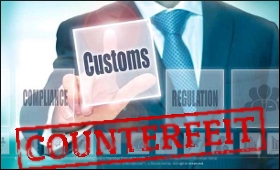|

|
Counter counterfeiting
|
|

|
|
| Top Stories |
 |
|
|
|
Bikky Khosla | 24 Oct, 2017
Counterfeiting and piracy pose a serious global challenge, and like in many other countries in the world, they have assumed a grave dimension also in India. According a recent report by KPMG-FICCI, the seizure value -- based on data of the Directorate of Revenue Intelligence -- for misdeclared goods was Rs 1,187 crore in 2016, while that of undervalued goods was Rs 254 crore. The seizure value from misuse of end-use amounted to Rs 2,780 crore, seeing a rise from Rs 953 crore in 2015. These figures tell a lot about the astounding growth of illicit trade and smuggling in India.
The consequences of such illicit trade are far-reaching. It creates a significant drain on the economy, facilitating a black economy, depriving the government of revenues and placing higher tax burdens on citizens. Businesses suffer as fake goods rob them of profit, reputation and customer satisfaction. Consumers, being exposed to low quality and ineffective products, may suffer as well. Additionally, social costs of counterfeiting and piracy is massive as they dislocate hundreds of thousands of legitimate jobs. According to a report by OECD, it is estimated that total economic and social costs of such evil practices worldwide will rise to $1.54- $1.87 trillion by 2022 from $737- $898 billion in 2013.
Another major concern raised by the report is that counterfeiters are increasingly associating themselves with organized crime and terrorism. According to a commission of the United Nations, counterfeiting is the second largest source of criminal activities such as terrorism, globally. The report adds that smuggling, counterfeiting and piracy appeal to the terrorist organizations more than other means of financing because of the low risk associated with it as the legal framework in most countries are not as stringent for IP theft compared to the theft of other goods or illegal activities such as kidnapping and extortion.
The report is also an eye-opener for the fact that illicit trade can be a curse to small and medium enterprises. According to its findings, the Indian auto-component market, which is highly populated by SMEs, suffered a loss of Rs 10,501 crore in 2014 due to grey market which increased from Rs 9,198 crore in 2012. The same is the story with the packaged food industry which lost an estimated Rs 21,957 crore in 2014 with Rs 6,096 crore loss to the government. These findings call for increased efforts by government to counter illicit trade. We urgently need an institutionalized mechanism to stamp out counterfeiting and piracy .
I invite your opinions.
|
|
|
| |
|
|
|
|
|
|
|
Counterfieting in cosmetics and cleaning agent liquids
Gitanjali | Wed Oct 25 07:12:37 2017
Why is there no mandate to seal goods(maybe above a select price/size bracket atleast)? e.g. even shampoo bottles worth Rs.1000/- come with no seal and exposed to duplicate the content/refil it with an alternate low quality product. Also by not sealing isnt the Brand/Company too exposing its products to be replaced with a fake? Suprisingly this if found in Imported goods too.

Counter counterfeiting
Shashibhanu Sarvade | Wed Oct 25 05:03:35 2017
Agreed that there is counterfeiting at each stage from Production unit to Depots, to Distributors, to dealers & retailers. How to control counterfeit at these stages. Sometimes the company employees are involved. How to control it? Please suggest. Thanks

|
|
|
|
|
|
|
| |
| Customs Exchange Rates |
| Currency |
Import |
Export |
US Dollar
|
84.35
|
82.60 |
UK Pound
|
106.35
|
102.90 |
Euro
|
92.50
|
89.35 |
| Japanese
Yen |
55.05 |
53.40 |
| As on 12 Oct, 2024 |
|
|
| Daily Poll |
 |
 |
| Do you think Indian businesses will be negatively affected by Trump's America First Policy? |
|
|
|
|
|
| Commented Stories |
 |
|
|
|
|
|
| |
|